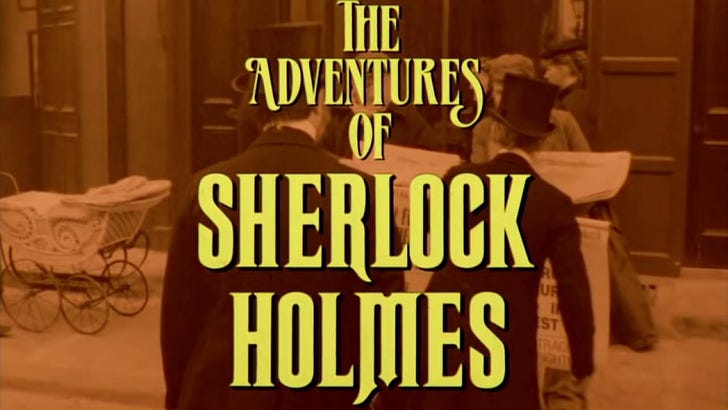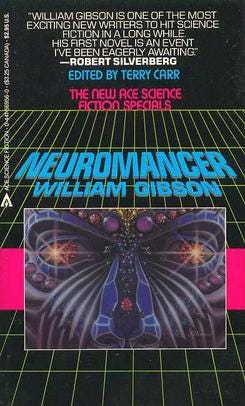Ryan Murdock Listens to 1984
Installment Two of the "Listening to _Your_ 1984" series. Here, acclaimed author Murdock revisits Sherlock Holmes, Pac-Man, Airwolf, Labatt's twist-off caps, and Canadian politics ca. 1984.
Dear friends,
We have a special treat this week as Ryan Murdock, acclaimed author of the true-crime exposé A Sunny Place for Shady People: How Malta Became One of the Most Curious and Corrupt Places in the World and the travel memoir Vagabond Dreams is here to share his memories of 1984 north of the border. It’s an honor and a delight to have him here.
Over to you, Ryan:
Ryan Murdock Listens to 1984
The sun may have shone on TV in ’85, but one year earlier mine was cast in sepia tones.
The Adventures of Sherlock Holmes brought some of my favourite short stories to life thanks to the utterly brilliant Jeremy Brett. Brett set out to be the best Holmes the world had ever seen, and even my bookish twelve-year-old self knew he outshone Basil Rathbone. His mesmerizing portrayal of the world’s first consulting detective comes to mind when thinking of 1984 because I’ve been revisiting it, but its late-Victorian tones were an exception in our pastel and neon years.
In Canada, Video Hits marked the dawn of a new age as the winding down of SCTV marked the end of the old. Our weekday after-school dose of music videos would soon be replaced by the round-the-clock MuchMusic channel — Canada’s answer to MTV — but it never captured the magic of seeing “Billie Jean,” “Uptown Girl,” and “Hungry Like the Wolf” for the first time.
Television debuts from over the border were much more interesting than our low-budget domestic fare.
Detectives were the rage as far back as I can remember, and I watched the new shows every night with my dad: Riptide, Mickey Spillane’s Mike Hammer, and his favourite, Crazy Like a Fox (he liked it because the old guy always outsmarted everyone else).
Ninjas were in and The Master was a hit, perhaps foreshadowing my own 22-year-long obsession with ninjutsu that saw me training daily from age 15 well into my 30s.
Helicopters were in, too, with not one but two primetime shows devoted to them. I preferred Airwolf to Blue Thunder, and who wouldn’t? Espionage is so much more interesting than law enforcement.
I wasn’t much of a sitcom watcher, but I did indulge a twelve-year-old’s crushes on girls my age from Who’s The Boss and Kate and Allie.
When it came to figuring out what to wear, I looked to a new cop show called Miami Vice for sartorial guidance. What better choice for grade 8 graduation than a white suit, pastel t-shirt and deck shoes? If only I’d had the Ferrari to go with it.
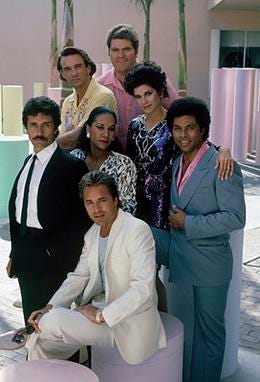
Music wasn’t the only thing to make the transition to television screens in 1984. Waves of Pac-Men and Pac-Women, Space Invaders and Donkey Kong were pushing in, too. We had an Atari 2600 but I was never big on video games. Those early joysticks were too fragile to throw. Ours were scarred with the teeth marks of frustration, soon to be followed by layers of dust.
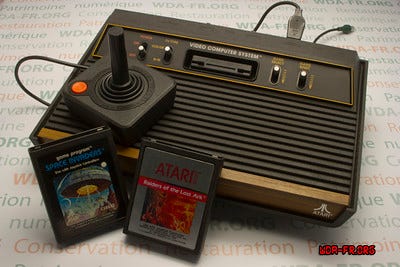
It was a pretty good year on the big screen, too, with Ghostbusters, The Karate Kid and the second Indiana Jones film all gracing our screens. And though it was a transparent Indy knockoff, Romancing The Stone was pretty good, too.
The most significant screen debut was by a man who would go on to shape our ‘80s teenage lives: John Hughes and Sixteen Candles. That film felt true to the adolescent angst we were living through, but so much about it is cringeworthy in hindsight. Hughes would hit his peak with The Breakfast Club, chronicling the brutal social structure of high school and how friendships can form across class boundaries. The ending might be naive, at least compared to the high school I remember, but the categories were real.
Neuromancer by William Gibson was 1984’s big bookshelf hit. I bought it because I loved sci fi but I can’t say I understood the future Gibson was showing us. The dystopia depicted in The Terminator was easier for my pre-teen mind to grasp.
And what of the world beyond unrequited crushes and pop culture? It barely existed for 12 year old me.
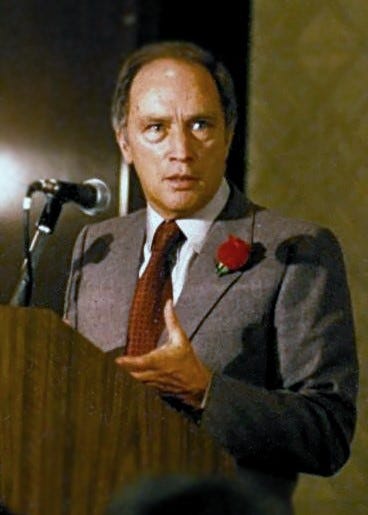
In Ottawa, an hour’s drive from my hometown, the arrogant, overspending Pierre Trudeau finally took his walk in the snow. He was replaced by Brian Mulroney, who won the largest parliamentary majority in Canadian history — a feat I hope to see surpassed when Trust Fund Justin Trudeau is finally given the boot next year.
Labatt’s introduced the first twist-off beer cap, an event I barely noticed at the time. This groundbreaking invention soon rendered keychain openers and belt buckles redundant, making my imminent teenage life much easier within the next few years.
Michael Jackson’s hair caught on fire while filming a Pepsi commercial, just before he burned up the charts with a record eight Grammy Awards. Clara Peller asked us “Where’s the beef?”, a question that seemed to apply to so much more than fast food.
And those irritating rear window decals informed strangers that there was a baby on board — as though any of us cared.
I look back on it all as a much simpler time.
We would never again be as cut off as we were in the analog era. When the first smart phones finally arrived, they dazzled with convenience and quietly killed the freedom to drop off the map.
Who could imagine a time when it would no longer be enough to go home when the street lights came on? Today’s parents track their children in real-time. A driver’s license no longer opens the long-coveted four lane highway to independence. And every dumb thing you ever did is recorded forever.
I’d be incarcerated in a reform school today or diagnosed with the dubious sounding “Oppositional Defiant Disorder” simply because I resented being told what to do. Instead, I have an encyclopedia of teenage stories so outrageous that kids today think I made them up.
I realize the ‘80s weren’t as innocent as our song lyrics and naive TV shows made them seem, but it really felt that way when we lived it. Perhaps because we didn’t say the quiet parts out loud.
Robert’s Postscript:
Ryan’s wonderful reminiscences reveal some holes in your regular correspondent’s coverage: While Blue Thunder—starring Dana Carvey, Dick Butkus, Bubba Smith, and a police helicopter—was gone after just a few rotations of its propeller blades, Airwolf had a substantial impact on both Ryan and myself, and by all rights should have its own standalone essay. (Would any of you folks like to take that baton from your harried writer for a future installment? Let me know.)
Similarly, I have been remiss in not making a return visit to Mickey Spillane’s Mike Hammer, a series that gave my ten-year-old self his first taste of noir. Still, we can be thankful to “I Want My DadTV” for making the first episode available on YouTube.
Lastly, I can’t mask my delight at Murdock’ unmasking of himself as a former ninja, thereby sealing his child-of-the-’80s bona fides…in blood.

